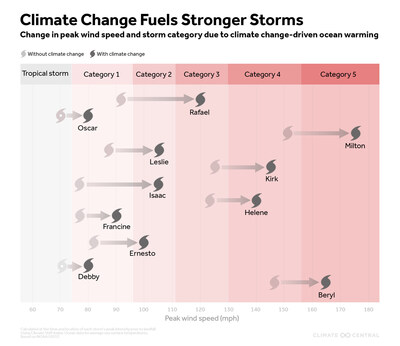
Cision PR Newswire
Climate Change Added 18 mph to Hurricane Wind Speeds over Past Five Years: Study
High ocean temperatures caused by global warming boosted maximum intensities for most storms between 2019 and 2023, as well as for every 2024 hurricane
PRINCETON, N.J. , Nov. 20, 2024 /PRNewswire/ -- Because of climate change, maximum wind speeds generated by 84% of Atlantic hurricanes between 2019 and 2023 intensified by an average of 18 miles per hour, according to a Climate Central study published today in Environmental Research: Climate. Fueled by sea surface temperatures made hotter by global warming, 30 hurricanes in the study reached intensities roughly one category higher on the Saffir-Simpson Hurricane Wind Scale compared to their expected strength in an environment without the influence of human-caused climate change.
The study applied sea surface temperature attribution science to established methods for calculating their contribution to tropical cyclone intensity.
The study identified three storms that strengthened into Category 5 hurricanes because of climate change: Lorenzo (2019), Ian (2022), and Lee (2023). Applying the framework to the 2024 season adds two more storms whose development into Category 5 hurricanes would have been unlikely without the influence of climate change: Beryl and Milton. A companion report on the 2024 Atlantic Basin hurricane season released today by Climate Central found that maximum wind speeds for all eleven hurricanes to date were increased by 9 to 28 miles per hour because of elevated sea surface temperatures caused by climate change.
"Every hurricane in 2024 was stronger than it would have been 100 years ago," Dr. Daniel Gilford, climate scientist at Climate Central and lead author of the study and report, said. "Through record-breaking ocean warming, human carbon pollution is worsening hurricane catastrophes in our communities."
In particular, Hurricane Milton rapidly intensified by 120 miles per hour in less than 36 hours over waters whose temperatures were made 400-800 times more likely by climate change, according to a Climate Shift Index: Ocean analysis. Those record-setting temperatures, commonly more than three degrees Fahrenheit above normal, would be virtually impossible without the influence of carbon pollution.
The study focused on storms in the Atlantic Basin, but the resulting rapid attribution framework can be used to study tropical cyclones worldwide.
"There is an urgent need to quantify and communicate the impact of climate change on hurricanes," Dr. Ralf Toumi, co-director of the Grantham Institute – Climate Change and Environment, Imperial College London said. "In this outstanding paper, Gilford, Giguere, and Pershing present an impressive new framework. It uses the well understood and tested concept of maximum potential intensity of hurricanes and combines this with the climate change fingerprint on sea surface temperatures. This original and thorough work now offers us a route to rapid attribution of hurricane intensity to climate change."
Resources:
- The Environmental Research: Climate study, "Human-caused ocean warming has intensified recent hurricanes" is available at: https://iopscience.iop.org/article/10.1088/2752-5295/ad8d02
- Climate Central's companion report on the impact of climate change on the 2024 hurricane season is available at: https://www.climatecentral.org/report/2024-hurricane-attribution
- The Climate Shift Index: Ocean tool calculating the daily influence of climate change on global sea surface temperatures is available at: https://csi.climatecentral.org/ocean
About Climate Central
Climate Central is a non-advocacy, non-profit science and news organization providing authoritative information to help the public and policymakers make sound decisions about climate and energy.
![]() View original content to download multimedia:https://www.prnewswire.com/news-releases/climate-change-added-18-mph-to-hurricane-wind-speeds-over-past-five-years-study-302311328.html
View original content to download multimedia:https://www.prnewswire.com/news-releases/climate-change-added-18-mph-to-hurricane-wind-speeds-over-past-five-years-study-302311328.html
SOURCE Climate Central

NOTE: This content is not written by or endorsed by "WGNO", its advertisers, or Nexstar Media Inc.
